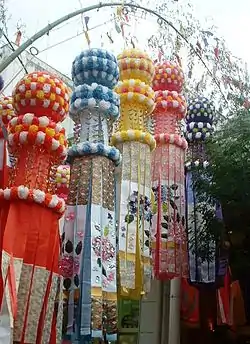七夕
Chinese
| seven | dusk; evening | ||
|---|---|---|---|
| trad. (七夕) | 七 | 夕 | |
| simp. #(七夕) | 七 | 夕 | |
Pronunciation
Proper noun
七夕
- (~節) Qixi Festival (the Chinese Valentine's Day, which falls on the seventh day of the seventh lunar month)
Synonyms
| Variety | Location | Words edit |
|---|---|---|
| Formal (Written Standard Chinese) | 七夕 | |
| Mandarin | Taiwan | 七夕 |
| Harbin | 七月七 | |
| Yantai (Muping) | 七月兒七 | |
| Jinan | 七月七 | |
| Luoyang | 祈巧節, 七月七 | |
| Wanrong | 七月七 | |
| Xi'an | 七月七 | |
| Yinchuan | 七夕, 乞巧節 | |
| Lanzhou | 七月七 | |
| Xining | 乞巧, 七月七 | |
| Ürümqi | 七月七 | |
| Wuhan | 七月七 | |
| Chengdu | 七月初七, 七月七, 乞巧節 | |
| Guiyang | 七月初七, 七月七 | |
| Liuzhou | 七月七 | |
| Xuzhou | 七月七 | |
| Yangzhou | 七巧 | |
| Nanjing | 七月七, 七巧 | |
| Cantonese | Guangzhou | 七姐節 |
| Hong Kong | 七姐誕, 七夕 | |
| Dongguan | 七月初七 | |
| Gan | Lichuan | 七夕 |
| Pingxiang | 七月七 | |
| Hakka | Miaoli (N. Sixian) | 七月七, 七娘生 |
| Pingtung (Neipu; S. Sixian) | 七月七, 七娘生 | |
| Hsinchu County (Zhudong; Hailu) | 七月七, 七娘生 | |
| Taichung (Dongshi; Dabu) | 七月七, 七星娘生, 七娘生 | |
| Hsinchu County (Qionglin; Raoping) | 七月七, 七娘生 | |
| Yunlin (Lunbei; Zhao'an) | 七月七, 七娘生 | |
| Huizhou | Jixi | 七月七 |
| Jin | Taiyuan | 七月七 |
| Xinzhou | 七月兒七 | |
| Min Bei | Jian'ou | 七月七 |
| Min Dong | Fuzhou | 七月七, 七月七夕 |
| Min Nan | Xiamen | 七娘媽生 |
| Quanzhou | 七娘媽生 | |
| Zhangzhou | 七娘媽生 | |
| Taipei | 七娘媽生 | |
| Kaohsiung | 七娘媽生 | |
| Yilan | 七夕 | |
| Changhua (Lukang) | 七娘媽生 | |
| Taichung | 七娘媽生 | |
| Taichung (Wuqi) | 七娘媽生 | |
| Tainan | 七娘媽生 | |
| Taitung | 七夕 | |
| Hsinchu | 七娘媽生 | |
| Penghu (Magong) | 七夕 | |
| Haikou | 七月初七暝 | |
| Southern Pinghua | Nanning (Tingzi) | 拜七姐 |
| Wu | Shanghai | 七月七, 七巧日, 七巧節 |
| Shanghai (Chongming) | 七月七 | |
| Suzhou | 七夕, 七月七 | |
| Danyang | 七巧, 七夕 | |
| Hangzhou | 七巧 | |
| Ningbo | 七月七 | |
| Wenzhou | 七月七 | |
| Jinhua | 七月七 | |
| Xiang | Changsha | 七巧節 |
Derived terms
|
|
Descendants
- → Japanese: 七夕 (shichiseki)
- → Korean: 칠석(七夕) (chilseok)
- → Vietnamese: Thất Tịch (七夕)
Japanese
Etymology 1

| Kanji in this term | |
|---|---|
| 七 | 夕 |
| たなばた | |
| Grade: 1 | Grade: 1 |
| jukujikun | |
| Alternative spellings |
|---|
| 棚機 棚幡 織女 |
Origins somewhat obscure.
The latter bata portion is generally accepted to be from 機 (hata, “a loom”). The hata reading for 機 changes to bata as an instance of rendaku (連濁).
The former tana portion may be from 棚 (tana, “a shelf, or a board placed lengthwise in a bridge”), in reference to an ancient ritual whereby a maiden would weave a special cloth on a hata in order to secure a bountiful harvest, as an offering for a god coming across a body of water via a tana. A related theory states that tana is instead an alteration of 種 (tane, “seed”). Yet another theory states that tana is an alteration of 手 (ta, “hand”, unbound Old Japanese form) + な (na, Old Japanese possessive particle superseded by no).[1]
The common spelling of 七夕 is an example of jukujikun, since the festival is held on the seventh night of the seventh month of the lunar calendar, now generally observed on 7 July.
Pronunciation
- (Irregular reading)
- (Tokyo) たなばた [tànábátá] (Heiban – [0])[2]
- IPA(key): [ta̠na̠ba̠ta̠]
Noun
七夕 • (tanabata)
- a type of loom (the original meaning)
- a type of weaving
- by extension, a weaver
- (figuratively) any extremely rare visit, or the person so visiting
Proper noun
七夕 • (Tanabata)
- the Tanabata Japanese star festival, observed on 7 July
Synonyms
- 七夕祭り (Tanabata matsuri)
- 星祭り (Hoshi matsuri)
- 七日盆 (Nanuka Bon)
Further reading
- List of festivals in Japan on Wiktionary
- List of festivals in Japan on Wikipedia
Etymology 2
| Kanji in this term | |
|---|---|
| 七 | 夕 |
| しち Grade: 1 | せき Grade: 1 |
| on’yomi | |
From Middle Chinese compound 七夕 (MC t͡sʰiɪt̚ ziᴇk̚, literally “seventh evening”). Compare modern Mandarin 七夕 (Qīxī).
Pronunciation
- On’yomi
- (Tokyo) しちせき [shìchíꜜsèkì] (Nakadaka – [2])[2]
- IPA(key): [ɕit͡ɕise̞kʲi]
Proper noun
七夕 • (Shichiseki)
- the Tanabata Japanese star festival, observed on 7 July
- the Chinese Qīxī Festival, also sometimes referred to as the Double Seventh Festival
References
- 1988, 国語大辞典(新装版) (Kokugo Dai Jiten, Revised Edition) (in Japanese), Tōkyō: Shogakukan
- 2006, 大辞林 (Daijirin), Third Edition (in Japanese), Tōkyō: Sanseidō, →ISBN
Korean
| Hanja in this term | |
|---|---|
| 七 | 夕 |
Noun
七夕 • (chilseok) (hangeul 칠석)
- Hanja form? of 칠석 (“Qixi”).
Vietnamese
| Hán tự in this term | |
|---|---|
| 七 | 夕 |
Noun
七夕
- chữ Hán form of Thất Tịch (“Qixi”).